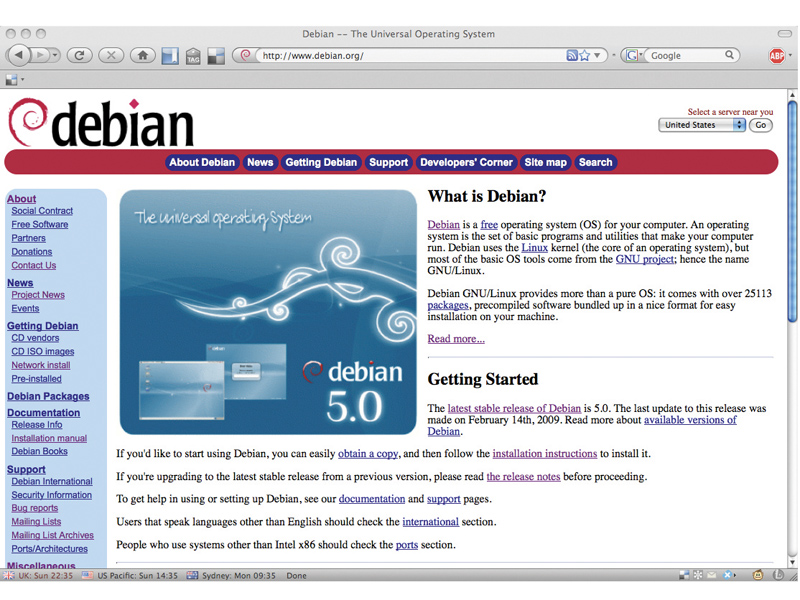Up close and personal with Debian 5.0
We take a deeper look at the latest stable release of Debian

Debian's been around now for an impressive 16 years and is still renowned for its reliability and stability – although it's sometimes criticised for its rather slow release process. It's also the distro that the very popular Ubuntu is based on.
The latest Debian version – 5.0, codenamed Lenny – was released on 14 February. This time it's taken almost two years to get from 4.0/Etch (released April 2007) to Lenny, which is about the standard length of release cycle for Debian in recent years.
Having said that, Lenny's been available as a testing release since just after the release of Etch, so at least some of you reading this will have already been using it. Those of us who are rather more cautious, or who run production servers, will be running upgrades as we type this and looking forward to checking Lenny out.
To mark the release, Linux Format magazine talked to some of the developers involved and took a look at the new stuff on offer.
What's new?
There's improved netbook support, including support for the Eee PC out of the box – this should also be really helpful for other netbook hardware. At the other end of the scale, the Orion platform (used in many storage devices) is also now supported and ARM support is improved with the move to the new Armel port and the inclusion of tools to produce packages for embedded ARM systems.
As you may be aware, there were some issues around hardware support that delayed the release: specifically, there were concerns about the extent to which the binary 'blobs' released by some firmware manufacturers complied with free software guidelines (which Debian is fairly strict about).
Sign up for breaking news, reviews, opinion, top tech deals, and more.
Binary blobs are bits of microcode that help drive hardware, and the licences under which the manufacturers release them vary and aren't always clear. The eventual decision was to prioritise getting Lenny out of the door and to avoid any radical reduction in hardware support that would penalise users.
There shouldn't be any hardware issues for users, but Debian will keep working to improve the licensing situation. The Lenny kernel is 2.4.26, and there is the expected stack of package updates. KDE moves to 3.5.10; Gnome is at 2.2.22, rather than 2.24, but is an upgraded version.
For stability reasons, GnomeVFS rather than GIO is used in Nautilus and another couple of apps, but most apps do now use GIO, with the consequent performance improvements. Perl 5.10, Python 2.5.2 and 2.4.6, PHP 5.2.6 are all included in the package, and GCC 4.3 is being shipped by default (it'll be 4.2 for some architectures though).
Iceweasel (the Debian version of Firefox) is upgraded to 3.0.0.6. OpenOffice 2.4 – rather than 3.0 – is included, but it's a custom version that includes support for MS Office's Open XML format. Since this is the biggest improvement in 3.0, it's not a major issue from the user's point of view.
On the multimedia front, the non-proprietary swfdecgnome codecs provide out-of-the-box Flash support, and the GStreamer 'ugly' package, which includes the MP3 codecs, is now part of the main repository and is downloaded with a full desktop environment install.
Also, Totem now supports automatic download of codecs. The upgrade to X.org 7.3 further improves X autoconfig – very good news for anyone who's ever bashed their head against configuring X by hand. You'll still need to jump through a few hoops to install proprietary drivers like the Nvidia ones – the free NV driver just isn't quite as good.
There are a couple of important security improvements, making security a little more proactive. The installer now applies security updates before the first reboot and the number of setuid root packages has been reduced, and there are now graphical menus for various sections of the install and an increase in the number of supported languages.
More for sysadmins
Rsyslog replaces syslog and klogd, improving system logging (you'll need to apply this manually if you're upgrading rather than installing from scratch). Rsyslog supports logging over TCP and SSL, writing to databases, and has much more configurability of output formats and email alerting, so it's a clear improvement on the older versions.
It's also backwards compatible, so it's a drop-in replacement; it looks like it'll be well worth the explicit upgrade, which should be seamless. Also of interest from a server perspective are the upgrades to MySQL 5.0.51a and PostgreSQL 8.3. Nagios moves to version 3 (with version 2 removed), and there are several virtualisation improvements as well.
So there's plenty here to be cheerful about! And of course there's stacks more upgrades to the thousands of packages offered in Debian, as well as more brand new packages. If you're looking for a solid, stable, well-supported Linux distribution, Debian is still the best going.
It's great that Lenny's finally out – even if you're happy with the trade-off between stability/reliability and being on the bleeding edge of the newest releases, it's still great to get new stuff! And now we can look forward to work starting on Squeeze…